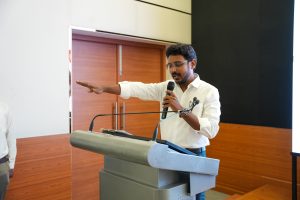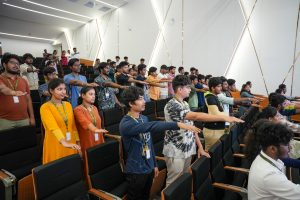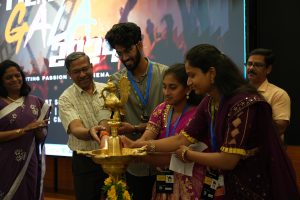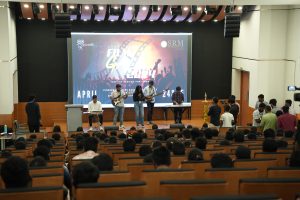All Management Events
- Dr P S Biswa Bhusan Sahoo May 16, 2024
- Groundbreaking Research on Optimal Routing Protocol in IEEE Sensors Journal May 15, 2024
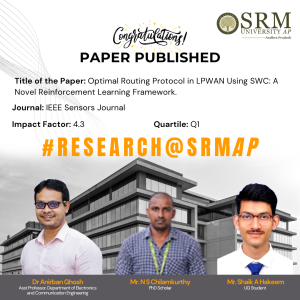 In a significant academic achievement, Dr Anirban Ghosh, Assistant Professor from the Department of Electronics and Communication Engineering along with Mr Naga Srinivasarao Chilamkurthy, PhD Scholar, and Mr Shaik Abdul Hakeem, an undergraduate student, have made a remarkable contribution to the field of communication engineering. Their paper, titled “Optimal Routing Protocol in LPWAN Using SWC: A Novel Reinforcement Learning Framework,” has been published in the esteemed IEEE Sensors Journal, with an impressive impact factor of 4.3.
In a significant academic achievement, Dr Anirban Ghosh, Assistant Professor from the Department of Electronics and Communication Engineering along with Mr Naga Srinivasarao Chilamkurthy, PhD Scholar, and Mr Shaik Abdul Hakeem, an undergraduate student, have made a remarkable contribution to the field of communication engineering. Their paper, titled “Optimal Routing Protocol in LPWAN Using SWC: A Novel Reinforcement Learning Framework,” has been published in the esteemed IEEE Sensors Journal, with an impressive impact factor of 4.3.This publication marks a milestone for the university and highlights the innovative research being conducted by its faculty and students. The paper delves into the development of an optimal routing protocol for Low-Power Wide-Area Network (LPWAN) using State-Wise Communication (SWC), employing a novel reinforcement learning framework to enhance network efficiency and performance.
This work will pave the way for advancements in LPWAN technologies, which are crucial for the Internet of Things (IoT) ecosystem. The university community celebrates this achievement and looks forward to the positive impact it will have on technology and society.Abstract:
Low Power Wide Area Network (LPWAN) has emerged as a dominating communication technology that offers low-power and wide coverage for the Internet of Things (IoT) applications. However, the direct data transmission approach has a limited network lifetime. Even multi-hop data transmission experiences several difficulties including high data latency, poor bandwidth utilization, and reduced data throughput. To overcome these challenges, in this paper, a recent breakthrough in social networks known as Small-World Characteristics (SWC) is incorporated into LPWANs.In particular, in this work, Small-World LPWANs (SW-LPWANs) are developed by using the Reinforcement Learning (RL) technique and using different node centrality measures like degree, betweenness, and closeness centrality. Further, the performance of the developed SW-LPWANs is evaluated in terms of energy efficiency (alive/dead devices, and network residual energy) and Quality-of-Service (average data latency, data throughput, and bandwidth utilization), and is compared with that of conventional multi-hop LPWAN. Finally, to validate the simulation results, similar analyses are performed on the real-field LPWAN testbed.
The obtained simulation results confirm that SW-LPWAN developed by the RL method performs better than other techniques, with 11% more alive devices, 5.5% higher residual energy, 2.4% improved data throughput, and 14% efficient bandwidth utilization compared to the next best method. A similar trend is observed with real-field LPWAN testbed data also.
Explanation of the Research in Layperson’s Terms
Social networks primarily revolve around establishing human connections, whereas LPWANs are designed for connecting IoT devices that have limited battery-driven power. In this context, the smart devices must communicate in an IoT setting to conserve the limited energy available to them. To achieve this, the concept at the core of social networking also known as small world characteristic is incorporated into LPWAN using the Q-learning technique.
Practical Implementation or the Social Implications of the Research
IoT applications such as remote healthcare, smart environmental monitoring, asset tracking, and smart traffic systems require low transmission delay and high network lifetime. The proposed research helps in achieving the above parameters.
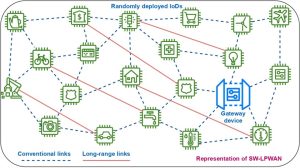
Collaborations
Dr Om Jee Pandey, Assistant professor Department of Electronics Engineering, Indian Institute of Technology, (BHU), Varanasi. e-mail: omjee.ece@iitbhu.ac.inDr Linga Reddy Cenkeramaddi, Professor, Department of Information and Communication Technology, University of Agder, Norway. e-mail:linga.cenkeramaddi@uia.no
Future Research Plan
Continue reading →
In the next phase of research, we will be interested in investigating how the energy efficiency and other quality of service of smart devices in an IoT setting can be improved if they are partially or completely mobile. - An Inventive Navigation System for the Visually Impaired May 15, 2024
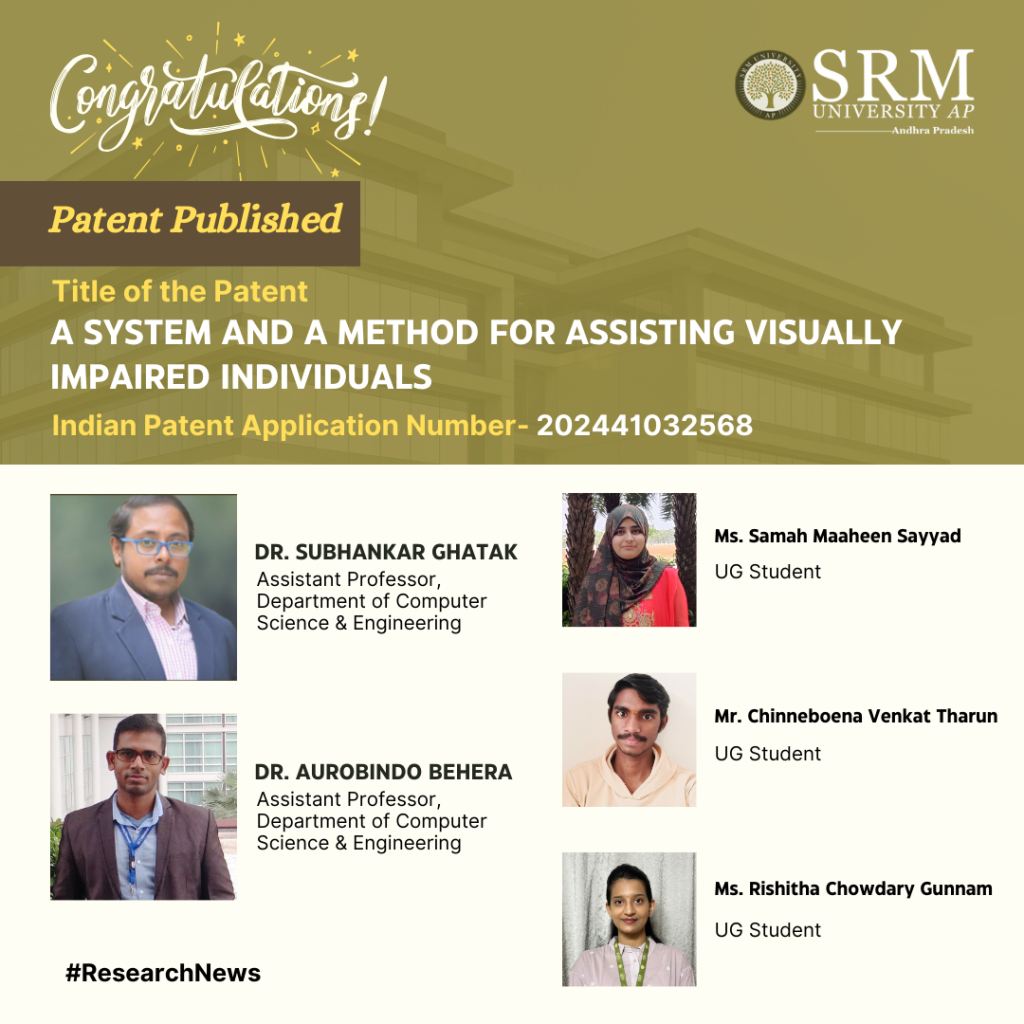
The Department of Computer Science and Engineering is proud to announce that the patent titled “A System and a Method for Assisting Visually Impaired Individuals” has been published by Dr Subhankar Ghatak and Dr Aurobindo Behera, Asst Professors, along with UG students, Mr Samah Maaheen Sayyad, Mr Chinneboena Venkat Tharun, and Ms Rishitha Chowdary Gunnam. Their patent introduces a smart solution to help visually impaired people navigate busy streets more safely. The research team uses cloud technology to turn this visual information into helpful vocal instructions that the users can hear through their mobile phones. These instructions describe things like traffic signals, crosswalks, and obstacles, making it easier for them to move around independently, making way for an inclusive society.
Abstract
This patent proposes a novel solution to ease navigation for visually impaired individuals. It integrates cloud technology, computer vision algorithms, and Deep Learning Algorithms to convert real-time visual data into vocal cues delivered through a mobile app. The system employs wearable cameras to capture visual information, processes it on the cloud, and delivers relevant auditory prompts to aid navigation, enhancing spatial awareness and safety for visually impaired users.
Practical implementation/Social implications of the research
The practical implementation of the research involves several key components.
- Developing or optimising wearable camera devices that are comfortable and subtle for visually impaired individuals. These cameras should be capable of capturing high-quality real-time visual data.
- A robust cloud infrastructure is required to process this data quickly and efficiently using advanced computer vision algorithms and deep learning algorithms.
- Design and develop a user-friendly mobile application that delivers processed visual information as vocal cues in real-time. This application should be intuitive, customisable, and accessible to visually impaired users.
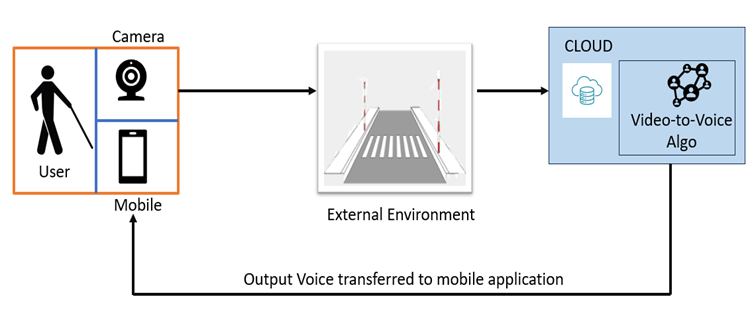
Fig.1: Schematic representation of the proposal
The social implications of implementing this research are significant. We can greatly enhance their independence and quality of life by providing visually impaired individuals with a reliable and efficient navigation aid. Navigating city environments can be challenging and hazardous for the visually impaired, leading to increased dependency and reduced mobility. The research aims to mitigate these challenges by empowering users to navigate confidently and autonomously. This fosters a more inclusive society where individuals with visual impairments can participate actively in urban mobility, employment, and social activities.
In the future, the research cohort plans to further enhance and refine technology to better serve the needs of visually impaired individuals. This includes improving the accuracy and reliability of object recognition and scene understanding algorithms to provide more detailed and contextually relevant vocal cues. Additionally, they aim to explore novel sensor technologies and integration methods to expand the capabilities of our system, such as incorporating haptic feedback for enhanced spatial awareness. Furthermore, we intend to conduct extensive user testing and feedback sessions to iteratively improve the usability and effectiveness of our solution. This user-centric approach will ensure that our technology meets the diverse needs and preferences of visually impaired users in various real-world scenarios.
Moreover, the team is committed to collaborating with stakeholders, including advocacy groups, healthcare professionals, and technology companies, to promote the adoption and dissemination of this technology on a larger scale. By fostering partnerships and engaging with the community, they can maximise the positive impact of their research on the lives of visually impaired individuals worldwide.
Continue reading → - Develop Strong Programming & Mathematics Skills with BSc Computer Science May 14, 2024

As you navigate through subjects like Biological Psychology, Social Psychology, and Cognitive Psychology, you’ll gain profound insights into the intricacies of the human psyche. But the allure of a BSc in Psychology extends far beyond the classroom.
With the demand for clinical and counselling psychologists projected to surge by 11% by 2032, this degree opens doors to a multitude of fulfilling career pathways. Whether you aspire to guide individuals through life’s challenges as a clinical psychologist or provide empathetic support as a counselling psychologist, the opportunities are boundless.
You can join this extraordinary academic odyssey, where you’ll not only expand your intellectual horizons with BSc Psychology subjects but also embark on a rewarding journey of personal and professional growth.
BSc Psychology Subjects Lists
Here’s a list of common subjects typically included in a BSc Psychology programme:
Introduction to Psychology
Biological Psychology
Cognitive Psychology
Developmental Psychology
Social Psychology
Abnormal Psychology
Personality Psychology
Statistics for Psychology
Research Methods in Psychology
Psychological Testing and Assessment
Clinical Psychology
Counselling Psychology
Industrial-Organisational Psychology
Health Psychology
Forensic Psychology
Cross-Cultural Psychology
Neuropsychology
Educational Psychology
Positive Psychology
Environmental Psychology
Keep in mind that the specific subjects offered may vary depending on the university and the curriculum structure of the BSc Psychology programme.
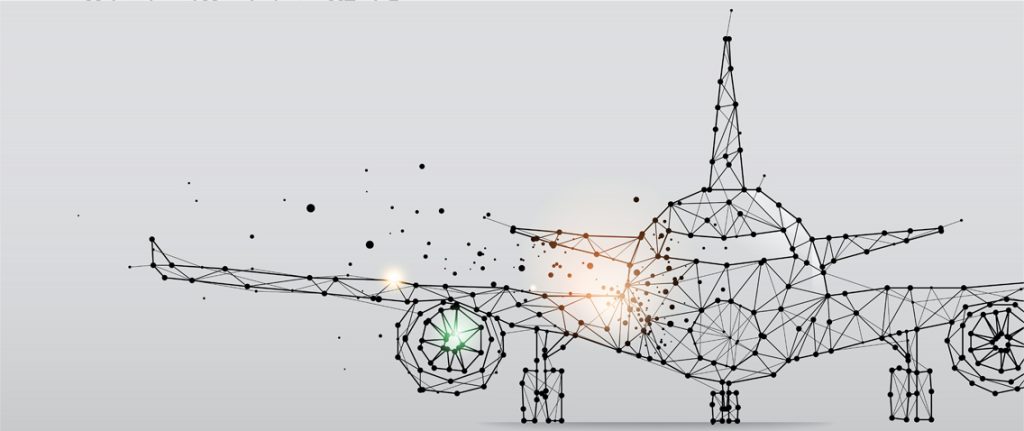
BSc Psychology Syllabus
Given below is the year-wise subject and syllabus of BSc Psychology:
Graduates with a Materials and Manufacturing MTech degree can access rewarding and well-paying positions in areas such as,
-
- Aerospace engineering
- Automotive engineering
- Biomedical engineering
– that require expertise in materials and manufacturing technology.
The practical knowledge gained from Materials and Manufacturing MTech studies can help develop new materials for use in production pipelines or create innovative manufacturing processes that streamline production times whilst improving quality control, making the Materials and Manufacturing MTech degree beneficial to the individual graduate and employers alike.
- Surplus Opportunities to Work on Research Projects
Pursuing an MTech degree provides opportunities to work on research projects, which can create networking opportunities and help you hone your skills.
For example, Thermal MTech students get to explore the fascinating field of Thermal engineering, such as Thermal design and Thermal analysis.
They also get to work on projects related to,
-
- Thermal energy management
- Thermal systems design
- Thermal control systems.
- The Bright Side of Thermal Engineering
Working on research projects in Thermal engineering can also give students an edge in the industry as it enhances their understanding of Thermal principles and technologies.
Valuable industry experience and essential connections in the Thermal engineering field through their research work.
All these advantages make pursuing an MTech degree worthwhile for those interested in Thermal engineering.
MTech provides invaluable insight into the latest breakthroughs and technologies in your field, helping you stay ahead of the curve.
Studying for an MTech can provide immense advantages for those in the technological field, particularly IoT technologies. Not only does it offer the opportunity to gain higher qualifications and broaden skills, but it can also provide invaluable insight into the latest IoT breakthroughs and technologies, helping students stay ahead of the curve.
- The Perks of an MTech in VLSI
An MTech in VLSI will allow you to develop advanced knowledge and skills, making a VLSI engineer highly sought after in many industries. As a VLSI engineer, you can work with hardware design, device fabrication, circuit design and debugging, amongst other skills, which will give you a competitive edge over other job applicants.
- Possibilities of the Internet of Things (IoT)

IoT (Internet of Things) related coursework provides students with comprehensive technical and practical insight into IoT systems development. Technical topics like IoT architecture, IoT standards and IoT security are taught in detail, enabling those who complete the program to gain specialised knowledge in the IoT domain.
Furthermore, the programme also typically offers a research-based thesis which enables students to apply their IOT skills to real-world problems. In this way, MTech programmes provide an excellent opportunity for students to understand IoT systems and technologies deeply.
What to Expect From an MTech Degree?
-
- Opportunity to develop their professional skills through hands-on projects and internships
- Opportunity to become experts in Data Science and its associated technologies.
- Data Science is a rapidly evolving field, and an MTech will provide the guidance needed to stay current and be at the forefront of Data Science development.
- Provides students with the ability to gain a deeper understanding of Data Science and its applications, which can help them get better jobs or progress their careers.
Where Will You Be After graduation?
Upon graduation, MTech graduates are highly sought after in the job market, with many top companies offering competitive salaries for those with an MTech degree.
Furthermore, an MTech degree is a tremendous advantage as Thermal graduates are highly sought after in the job market.
Thermal graduates have specialised knowledge, making them more attractive to companies and often offered competitive salaries.
An MTech degree provides Thermal graduates with unique skills and qualifications that make them stand out in the job market and ensure they have a competitive advantage over other applicants.
Making the Most of Your MTech Degree; Yes That’s What Makes the difference!
With an MTech degree, you can pursue a plethora of career options.
What are the Most Coveted Career Options After MTech?
-
-
- Engineering
- Research and development
- Data science
- Materials and Manufacturing
-
- The Scope of Materials and Manufacturing
Materials and Manufacturing are two areas often explored in an MTech course.
-
-
- Provide you with knowledge of materials used in industries and hands-on experience working with them.
- Access to other related fields, such as chemical engineering and robotics.
- Enable you to develop expertise in manufacturing processes, including production planning, cost control and product design.
- On completing the degree, you can embark on a career as a Materials and Manufacturing Engineer with high growth prospects.
- Exclusive job opportunities in the government sector.
-
- The Future of MTech in VLSI
MTech in VLSI empowers students to get VLSI-related roles in the government and even industries like Aerospace, Medical electronics, Automotive industry, etc.
VLSI has become a popular technology due to its versatility in processing large amounts of data without lags. With the proper knowledge and specialised skillset gained through the course, you will be able to face the challenges of a competitive job market more confidently.
What is Stopping You From Grabbing That MTech Degree!
Pursuing an MTech degree can be a rewarding experience. It is an opportunity to gain the skills and knowledge needed to pursue specialised careers in your field of study.
With a vast range of opportunities that come with gaining an MTech degree, it is worth considering if you’re looking for specialised training and education.
With hard work and dedication, you can find great success in your chosen career after completing your MTech degree!
You are just a click away from pursuing your dream MTech Degree!
Continue reading → -
- Brace from Artificial Minds to Real Success with the Artificial Intelligence Course May 14, 2024

As you navigate through subjects like Biological Psychology, Social Psychology, and Cognitive Psychology, you’ll gain profound insights into the intricacies of the human psyche. But the allure of a BSc in Psychology extends far beyond the classroom.
With the demand for clinical and counselling psychologists projected to surge by 11% by 2032, this degree opens doors to a multitude of fulfilling career pathways. Whether you aspire to guide individuals through life’s challenges as a clinical psychologist or provide empathetic support as a counselling psychologist, the opportunities are boundless.
You can join this extraordinary academic odyssey, where you’ll not only expand your intellectual horizons with BSc Psychology subjects but also embark on a rewarding journey of personal and professional growth.
BSc Psychology Subjects Lists
Here’s a list of common subjects typically included in a BSc Psychology programme:
Introduction to Psychology
Biological Psychology
Cognitive Psychology
Developmental Psychology
Social Psychology
Abnormal Psychology
Personality Psychology
Statistics for Psychology
Research Methods in Psychology
Psychological Testing and Assessment
Clinical Psychology
Counselling Psychology
Industrial-Organisational Psychology
Health Psychology
Forensic Psychology
Cross-Cultural Psychology
Neuropsychology
Educational Psychology
Positive Psychology
Environmental Psychology
Keep in mind that the specific subjects offered may vary depending on the university and the curriculum structure of the BSc Psychology programme.

BSc Psychology Syllabus
Given below is the year-wise subject and syllabus of BSc Psychology:
Graduates with a Materials and Manufacturing MTech degree can access rewarding and well-paying positions in areas such as,
-
- Aerospace engineering
- Automotive engineering
- Biomedical engineering
– that require expertise in materials and manufacturing technology.
The practical knowledge gained from Materials and Manufacturing MTech studies can help develop new materials for use in production pipelines or create innovative manufacturing processes that streamline production times whilst improving quality control, making the Materials and Manufacturing MTech degree beneficial to the individual graduate and employers alike.
- Surplus Opportunities to Work on Research Projects
Pursuing an MTech degree provides opportunities to work on research projects, which can create networking opportunities and help you hone your skills.
For example, Thermal MTech students get to explore the fascinating field of Thermal engineering, such as Thermal design and Thermal analysis.
They also get to work on projects related to,
-
- Thermal energy management
- Thermal systems design
- Thermal control systems.
- The Bright Side of Thermal Engineering
Working on research projects in Thermal engineering can also give students an edge in the industry as it enhances their understanding of Thermal principles and technologies.
Valuable industry experience and essential connections in the Thermal engineering field through their research work.
All these advantages make pursuing an MTech degree worthwhile for those interested in Thermal engineering.
MTech provides invaluable insight into the latest breakthroughs and technologies in your field, helping you stay ahead of the curve.
Studying for an MTech can provide immense advantages for those in the technological field, particularly IoT technologies. Not only does it offer the opportunity to gain higher qualifications and broaden skills, but it can also provide invaluable insight into the latest IoT breakthroughs and technologies, helping students stay ahead of the curve.
- The Perks of an MTech in VLSI
An MTech in VLSI will allow you to develop advanced knowledge and skills, making a VLSI engineer highly sought after in many industries. As a VLSI engineer, you can work with hardware design, device fabrication, circuit design and debugging, amongst other skills, which will give you a competitive edge over other job applicants.
- Possibilities of the Internet of Things (IoT)

IoT (Internet of Things) related coursework provides students with comprehensive technical and practical insight into IoT systems development. Technical topics like IoT architecture, IoT standards and IoT security are taught in detail, enabling those who complete the program to gain specialised knowledge in the IoT domain.
Furthermore, the programme also typically offers a research-based thesis which enables students to apply their IOT skills to real-world problems. In this way, MTech programmes provide an excellent opportunity for students to understand IoT systems and technologies deeply.
What to Expect From an MTech Degree?
-
- Opportunity to develop their professional skills through hands-on projects and internships
- Opportunity to become experts in Data Science and its associated technologies.
- Data Science is a rapidly evolving field, and an MTech will provide the guidance needed to stay current and be at the forefront of Data Science development.
- Provides students with the ability to gain a deeper understanding of Data Science and its applications, which can help them get better jobs or progress their careers.
Where Will You Be After graduation?
Upon graduation, MTech graduates are highly sought after in the job market, with many top companies offering competitive salaries for those with an MTech degree.
Furthermore, an MTech degree is a tremendous advantage as Thermal graduates are highly sought after in the job market.
Thermal graduates have specialised knowledge, making them more attractive to companies and often offered competitive salaries.
An MTech degree provides Thermal graduates with unique skills and qualifications that make them stand out in the job market and ensure they have a competitive advantage over other applicants.
Making the Most of Your MTech Degree; Yes That’s What Makes the difference!
With an MTech degree, you can pursue a plethora of career options.
What are the Most Coveted Career Options After MTech?
-
-
- Engineering
- Research and development
- Data science
- Materials and Manufacturing
-
- The Scope of Materials and Manufacturing
Materials and Manufacturing are two areas often explored in an MTech course.
-
-
- Provide you with knowledge of materials used in industries and hands-on experience working with them.
- Access to other related fields, such as chemical engineering and robotics.
- Enable you to develop expertise in manufacturing processes, including production planning, cost control and product design.
- On completing the degree, you can embark on a career as a Materials and Manufacturing Engineer with high growth prospects.
- Exclusive job opportunities in the government sector.
-
- The Future of MTech in VLSI
MTech in VLSI empowers students to get VLSI-related roles in the government and even industries like Aerospace, Medical electronics, Automotive industry, etc.
VLSI has become a popular technology due to its versatility in processing large amounts of data without lags. With the proper knowledge and specialised skillset gained through the course, you will be able to face the challenges of a competitive job market more confidently.
What is Stopping You From Grabbing That MTech Degree!
Pursuing an MTech degree can be a rewarding experience. It is an opportunity to gain the skills and knowledge needed to pursue specialised careers in your field of study.
With a vast range of opportunities that come with gaining an MTech degree, it is worth considering if you’re looking for specialised training and education.
With hard work and dedication, you can find great success in your chosen career after completing your MTech degree!
You are just a click away from pursuing your dream MTech Degree!
Continue reading → -
- Unlocking Cholesterol Homeostasis: A Mathematical Modelling Perspective May 14, 2024
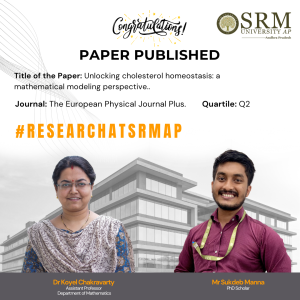 In a significant stride towards understanding cholesterol homeostasis, Dr Koyel Chakravarty, Assistant Professor and Mr Sukdeb Manna, a PhD Scholar in the Department of Mathematics has co-authored a paper titled “Unlocking Cholesterol Homeostasis: A Mathematical Modelling Perspective.” The paper has been published in the esteemed journal, The European Physical Journal Plus, with an impact factor of 3.4. This collaborative effort showcases the innovative application of mathematical modelling in unravelling the complexities of cholesterol regulation within the body.
In a significant stride towards understanding cholesterol homeostasis, Dr Koyel Chakravarty, Assistant Professor and Mr Sukdeb Manna, a PhD Scholar in the Department of Mathematics has co-authored a paper titled “Unlocking Cholesterol Homeostasis: A Mathematical Modelling Perspective.” The paper has been published in the esteemed journal, The European Physical Journal Plus, with an impact factor of 3.4. This collaborative effort showcases the innovative application of mathematical modelling in unravelling the complexities of cholesterol regulation within the body.The research not only contributes to the existing body of knowledge in this field but also sheds light on potential avenues for further exploration and understanding. Dr Chakravarty and Mr. Manna’s work underscores the importance of interdisciplinary approaches in scientific research and highlights SRM University-AP’s commitment to fostering cutting-edge research and innovation.
Their collaborative efforts serve as an inspiration to aspiring researchers and underscore the university’s dedication to pushing the boundaries of knowledge and discovery. Congratulations to Dr Chakravarty and Mr Manna on this remarkable achievement, and we look forward to more groundbreaking contributions from them in the future.
Abstract:
Limited progress in the mathematical modelling of cholesterol transport systems is hampering novel therapeutic interventions. This issue is addressed by the present study through precise design, employing four compartmental models to elucidate cholesterol dynamics in the comprehensive bloodstream. Disparities in medical advancements, particularly in cholesterol-related pathophysiology, are aimed to be bridged, advancing medical science and patient care outcomes.Therapeutic strategies for reducing blood cholesterol are explored by the model, with parameter influences on equilibrium stability revealed through sensitivity analysis. System parameters are effectively manipulated by imposing sensitivity analysis, and pinpointing areas for model refinement. Stability analysis contributes to diverse realistic models, confirming local asymptotic stability. Model efficacy in studying cholesterol transport dynamics is supported by analytical and numerical assessments. The study concludes with the present model validation to substantiate it by comparing the present outcomes with the existing ones.
Explanation of The Research in Layperson’s Terms:
Basically, scientists are having trouble figuring out how to model how cholesterol moves around in the body, which is important for developing new treatments. This study tries to solve that problem by creating detailed models that show how cholesterol behaves in different parts of the bloodstream. The goal is to bridge the gap in medical knowledge about cholesterol-related problems and improve how we treat patients. The models help us understand how different treatments might affect cholesterol levels, and by analyzing them closely, we can figure out which factors are most important. This lets us tweak the models to make them more accurate. The study shows that the models are reliable by testing them both analytically and numerically, and comparing the results to what we already know.
Practical Implementation or the Social Implications of the Research
1. Personalized Medicine: The mathematical models developed in this research could help in designing personalized treatment plans for individuals with high cholesterol levels. By understanding how different factors affect cholesterol dynamics, doctors can tailor therapies to each patient’s specific needs, leading to more effective and targeted treatments.
2. Drug Development: Pharmaceutical companies could use these models to screen potential drugs for lowering cholesterol. By simulating how different compounds interact with cholesterol transport systems, researchers can identify promising candidates for further testing, potentially speeding up the drug development process.
3. Healthcare Cost Reduction: Better understanding of cholesterol dynamics could lead to more efficient use of healthcare resources. By optimizing treatment strategies and preventing complications related to high cholesterol, healthcare costs associated with conditions like heart disease could be reduced, benefiting both individuals and society.
4. Public Health Initiatives: Insights from the research could inform public health initiatives aimed at reducing cholesterol-related diseases. For example, policymakers could use the models to design targeted interventions such as education campaigns promoting healthy lifestyle choices or policies to improve access to cholesterol-lowering medications.
5. Improved Patient Outcomes: Ultimately, the goal of this research is to improve patient outcomes by better understanding and managing cholesterol homeostasis. By developing more accurate models of cholesterol transport dynamics, healthcare providers can make more informed decisions, leading to better control of cholesterol levels and reduced risk of cardiovascular disease and other related conditions.Future Research Plans:
1. Current models may focus on a limited set of factors influencing cholesterol transport. Future research could explore the integration of additional biological factors such as genetic variations, hormonal influences, and dietary components into the models to create a more comprehensive understanding of cholesterol homeostasis.
2. Most existing models of cholesterol transport assume static conditions. Future research could develop dynamic models that capture the time-dependent changes in cholesterol levels in response to various stimuli, such as meals, physical activity, and medication intake. Dynamic models would provide a more accurate representation of real-world cholesterol dynamics and enable the evaluation of time-sensitive interventions.Picture Related to the Research
Continue reading →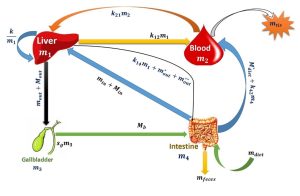
- Navigating BSc Psychology Subjects: Essential Insights for Aspiring Psychologists May 11, 2024

As you navigate through subjects like Biological Psychology, Social Psychology, and Cognitive Psychology, you’ll gain profound insights into the intricacies of the human psyche. But the allure of a BSc in Psychology extends far beyond the classroom.
With the demand for clinical and counselling psychologists projected to surge by 11% by 2032, this degree opens doors to a multitude of fulfilling career pathways. Whether you aspire to guide individuals through life’s challenges as a clinical psychologist or provide empathetic support as a counselling psychologist, the opportunities are boundless.
You can join this extraordinary academic odyssey, where you’ll not only expand your intellectual horizons with BSc Psychology subjects but also embark on a rewarding journey of personal and professional growth.
BSc Psychology Subjects Lists
Here’s a list of common subjects typically included in a BSc Psychology programme:
Introduction to Psychology
Biological Psychology
Cognitive Psychology
Developmental Psychology
Social Psychology
Abnormal Psychology
Personality Psychology
Statistics for Psychology
Research Methods in Psychology
Psychological Testing and Assessment
Clinical Psychology
Counselling Psychology
Industrial-Organisational Psychology
Health Psychology
Forensic Psychology
Cross-Cultural Psychology
Neuropsychology
Educational Psychology
Positive Psychology
Environmental Psychology
Keep in mind that the specific subjects offered may vary depending on the university and the curriculum structure of the BSc Psychology programme.

BSc Psychology Syllabus
Given below is the year-wise subject and syllabus of BSc Psychology:
Graduates with a Materials and Manufacturing MTech degree can access rewarding and well-paying positions in areas such as,
-
- Aerospace engineering
- Automotive engineering
- Biomedical engineering
– that require expertise in materials and manufacturing technology.
The practical knowledge gained from Materials and Manufacturing MTech studies can help develop new materials for use in production pipelines or create innovative manufacturing processes that streamline production times whilst improving quality control, making the Materials and Manufacturing MTech degree beneficial to the individual graduate and employers alike.
- Surplus Opportunities to Work on Research Projects
Pursuing an MTech degree provides opportunities to work on research projects, which can create networking opportunities and help you hone your skills.
For example, Thermal MTech students get to explore the fascinating field of Thermal engineering, such as Thermal design and Thermal analysis.
They also get to work on projects related to,
-
- Thermal energy management
- Thermal systems design
- Thermal control systems.
- The Bright Side of Thermal Engineering
Working on research projects in Thermal engineering can also give students an edge in the industry as it enhances their understanding of Thermal principles and technologies.
Valuable industry experience and essential connections in the Thermal engineering field through their research work.
All these advantages make pursuing an MTech degree worthwhile for those interested in Thermal engineering.
MTech provides invaluable insight into the latest breakthroughs and technologies in your field, helping you stay ahead of the curve.
Studying for an MTech can provide immense advantages for those in the technological field, particularly IoT technologies. Not only does it offer the opportunity to gain higher qualifications and broaden skills, but it can also provide invaluable insight into the latest IoT breakthroughs and technologies, helping students stay ahead of the curve.
- The Perks of an MTech in VLSI
An MTech in VLSI will allow you to develop advanced knowledge and skills, making a VLSI engineer highly sought after in many industries. As a VLSI engineer, you can work with hardware design, device fabrication, circuit design and debugging, amongst other skills, which will give you a competitive edge over other job applicants.
- Possibilities of the Internet of Things (IoT)

IoT (Internet of Things) related coursework provides students with comprehensive technical and practical insight into IoT systems development. Technical topics like IoT architecture, IoT standards and IoT security are taught in detail, enabling those who complete the program to gain specialised knowledge in the IoT domain.
Furthermore, the programme also typically offers a research-based thesis which enables students to apply their IOT skills to real-world problems. In this way, MTech programmes provide an excellent opportunity for students to understand IoT systems and technologies deeply.
What to Expect From an MTech Degree?
-
- Opportunity to develop their professional skills through hands-on projects and internships
- Opportunity to become experts in Data Science and its associated technologies.
- Data Science is a rapidly evolving field, and an MTech will provide the guidance needed to stay current and be at the forefront of Data Science development.
- Provides students with the ability to gain a deeper understanding of Data Science and its applications, which can help them get better jobs or progress their careers.
Where Will You Be After graduation?
Upon graduation, MTech graduates are highly sought after in the job market, with many top companies offering competitive salaries for those with an MTech degree.
Furthermore, an MTech degree is a tremendous advantage as Thermal graduates are highly sought after in the job market.
Thermal graduates have specialised knowledge, making them more attractive to companies and often offered competitive salaries.
An MTech degree provides Thermal graduates with unique skills and qualifications that make them stand out in the job market and ensure they have a competitive advantage over other applicants.
Making the Most of Your MTech Degree; Yes That’s What Makes the difference!
With an MTech degree, you can pursue a plethora of career options.
What are the Most Coveted Career Options After MTech?
-
-
- Engineering
- Research and development
- Data science
- Materials and Manufacturing
-
- The Scope of Materials and Manufacturing
Materials and Manufacturing are two areas often explored in an MTech course.
-
-
- Provide you with knowledge of materials used in industries and hands-on experience working with them.
- Access to other related fields, such as chemical engineering and robotics.
- Enable you to develop expertise in manufacturing processes, including production planning, cost control and product design.
- On completing the degree, you can embark on a career as a Materials and Manufacturing Engineer with high growth prospects.
- Exclusive job opportunities in the government sector.
-
- The Future of MTech in VLSI
MTech in VLSI empowers students to get VLSI-related roles in the government and even industries like Aerospace, Medical electronics, Automotive industry, etc.
VLSI has become a popular technology due to its versatility in processing large amounts of data without lags. With the proper knowledge and specialised skillset gained through the course, you will be able to face the challenges of a competitive job market more confidently.
What is Stopping You From Grabbing That MTech Degree!
Pursuing an MTech degree can be a rewarding experience. It is an opportunity to gain the skills and knowledge needed to pursue specialised careers in your field of study.
With a vast range of opportunities that come with gaining an MTech degree, it is worth considering if you’re looking for specialised training and education.
With hard work and dedication, you can find great success in your chosen career after completing your MTech degree!
You are just a click away from pursuing your dream MTech Degree!
Continue reading → -
- #NoExcusesDay: Promoting Voter Awareness and Responsibility May 9, 2024
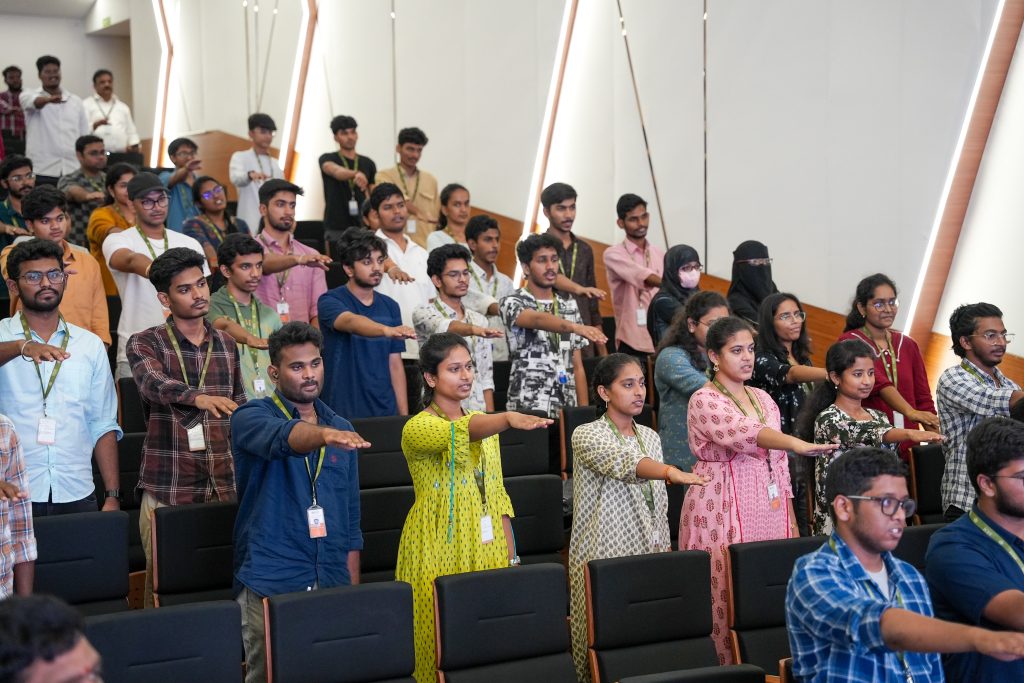
On the auspicious occasion of advocating for voter awareness and responsibility, a “#NoExcusesDay” event was held at SRM University-AP on May 09, 2024, organised by the Times of India and the Directorate of Communications of the university. The event, graced by Chief Guest, Mr Harendhira Prasad, Additional Chief Electoral Officer, aimed to emphasise the significance of voting in a democracy and to motivate citizens, especially the youth, to exercise their right to vote without fail.
The event commenced with the display of a motivating video message from President Draupadi Murmu, setting the tone for the importance of active participation in the electoral process. Highlighting the statistics of voting percentages in assembly elections from Hyderabad, the video presentation was followed by an address by Mr Rajiv Kumar, the Chief Election Commissioner, who underscored the importance of adding 97 crore voters to the electoral rolls.
The introduction of technology in the electoral process was a key point of discussion, with emphasis placed on the utilisation of advanced methods to ensure smooth and efficient polling. The staggering number of 10.5 lakh polling stations across the nation further underscored the magnitude of the electoral process.
Under the theme “Chunav Ka Parv Desh Ka Garv” (Festival of Elections, Pride of the Nation), the event witnessed active participation from students and faculty members alike. Mr Pankaj Belwariar, Director of Communications, and Mr Anil Nigam, Director of Student Affairs, graced the stage to extend their support and encouragement towards fostering a culture of voting. The event also provided a platform for students to share their first-time voting experiences. M. Kartika, Y. Ramya, V. Suma, and Tamineni Harnan Reddy shared their personal anecdotes, underscoring the sense of responsibility and empowerment that comes with casting a vote.
Mr Pankaj Belwariar’s impassioned speech resonated with the audience as he articulated the significance of treating voting as a non-negotiable duty. His “no-excuse day” message struck a chord, urging individuals to overcome obstacles and prioritise their democratic duty. Mr Anil Nigam elaborated on the disparities between rural and urban voting patterns, highlighting the heightened enthusiasm observed in rural areas. Aditya Challa, a fourth-year student, emphasised the symbiotic relationship between voting and the right to question, asserting, “No vote, no right to question.”
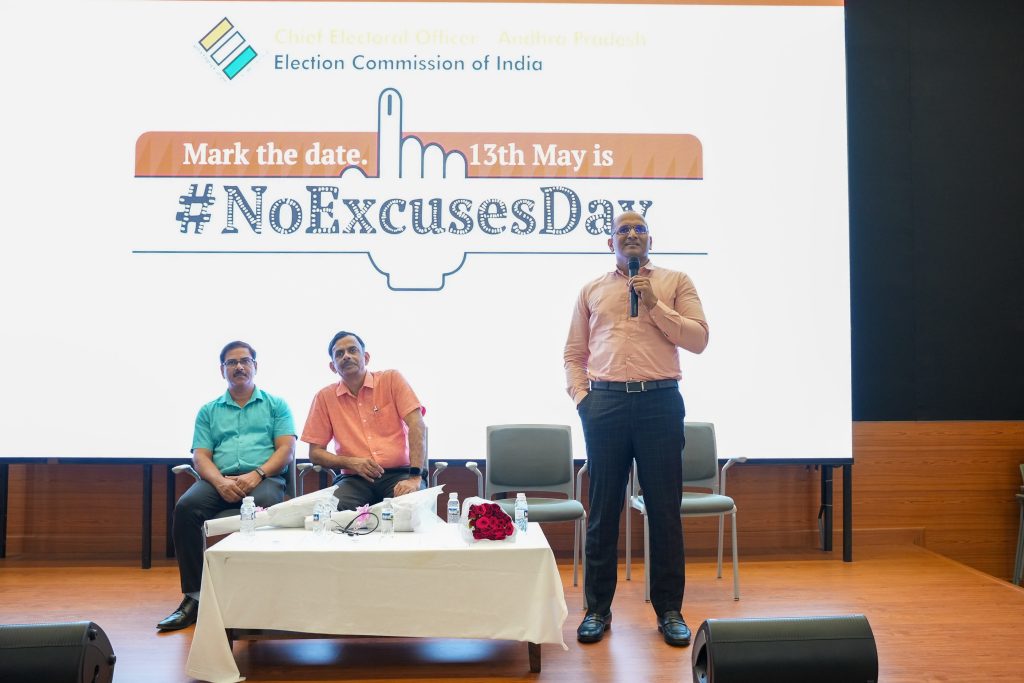
The event reached its pinnacle with the chief guest, Mr Harendhira Prasad’s speech, where the imperative nature of May 13th, termed as “D-day” for both assembly and Lok Sabha elections, was underscored. Stressing the importance of carrying approved identification cards for casting votes, the chief guest reiterated that voting is not just a right but a solemn duty that every citizen must fulfil.
The significance of the None of the Above (NOTA) option was elucidated, serving as a powerful tool for citizens to express dissent and demand accountability from political parties. The chief guest, Mr Harendhira Prasad, made a humble request for citizens to fulfil their duty with the same diligence as those involved in organising the elections, resonating deeply with the audience.
In conclusion, the event served as a poignant reminder of the privileges and responsibilities inherent in a democratic society. Through informative sessions, personal anecdotes, and impassioned speeches, attendees were galvanised to embrace their role in shaping the future of the nation through the simple yet profound act of voting. As May 13, 2024 approaches, the call to action reverberates loud and clear: no excuses, only votes.
Continue reading → - Film Gala 2024: A Spectacular Showcase of Talent and Creativity May 9, 2024
 On April 24-25, 2024, the much-anticipated Film Gala 2024 unfolded by SRM University-AP’s Cinemates Club, under the Directorate of Student Affairs, igniting the creative fervour of budding filmmakers from universities across India. This exhilarating event provided a vibrant platform for these talented individuals, budding to exhibit their cinematic prowess.
On April 24-25, 2024, the much-anticipated Film Gala 2024 unfolded by SRM University-AP’s Cinemates Club, under the Directorate of Student Affairs, igniting the creative fervour of budding filmmakers from universities across India. This exhilarating event provided a vibrant platform for these talented individuals, budding to exhibit their cinematic prowess.Graced by the presence of esteemed Tollywood actor Satya Dev and actress Archana as chief guests, the event was a star-studded affair filled with entertainment and enlightenment. Attendees were treated to mesmerizing dance performances, soulful music, engaging discussions, pulsating DJ sets, and a celebration of artistic brilliance that left everyone inspired.
The atmosphere at the Gala was electric, as aspiring filmmakers seized the opportunity to have their talents acknowledged and applauded. The Film Gala hosted an array of thrilling competitions, each pushing the boundaries of creativity:
- Cineverse: Where Stories Unfold: A short film competition that transported audiences through captivating narratives.
- Snake and Ladders: A playful twist on storytelling where every move leads to unexpected turns.
- Plot Saga: Your Journey With Scripts: A celebration of the art of scriptwriting, where imagination knew no bounds.
- Trailer Trek: Filmmakers raced against the clock, crafting gripping trailers that left viewers craving more.
- Cinerythm: Western dance took centre stage, with both group and solo performances.
- Character Canvas: Participants embodied iconic movie characters, showcasing their versatility.
- Galasymphony: The spotlight shifted to melodious voices in a spirited singing competition.
- Visual Fable: Every frame held a story, as participants created videos based on a central theme.
- Movie Night: A cinematic feast under the stars, where films came alive on the big screen.
- Cinematography Workshop: Aspiring cinematographers honed their skills, learning from industry experts.
The Film Gala was more than an event; it was a celebration of artistic brilliance. Aspiring filmmakers seized the opportunity to have their work recognized and appreciated. Their passion and dedication illuminated every corner of the venue, leaving an indelible mark on the cinematic landscape. Congratulations to the organisers, participants, students and everyone who contributed to making the Film Gala 2024 an unforgettable success!
Continue reading → - Dr Manjula R and Students Publish Book Chapter on Machine Learning in 6G Networks May 7, 2024
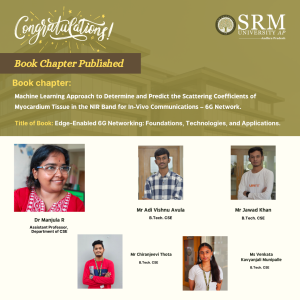 In an exciting development, Dr Manjula R, Assistant Professor in the Department of Computer Science and Engineering, along with B.Tech. students Mr Adi Vishnu Avula, Mr Jawad Khan, Mr Chiranjeevi Thota, and Ms Venkata Kavyanjali Munipalle, have authored a book chapter titled “Machine Learning Approach to Determine and Predict the Scattering Coefficients of Myocardium Tissue in the NIR Band for In-Vivo Communications – 6G Network in book name “Edge-Enabled 6G Networking: Foundations, Technologies, and Applications”.
In an exciting development, Dr Manjula R, Assistant Professor in the Department of Computer Science and Engineering, along with B.Tech. students Mr Adi Vishnu Avula, Mr Jawad Khan, Mr Chiranjeevi Thota, and Ms Venkata Kavyanjali Munipalle, have authored a book chapter titled “Machine Learning Approach to Determine and Predict the Scattering Coefficients of Myocardium Tissue in the NIR Band for In-Vivo Communications – 6G Network in book name “Edge-Enabled 6G Networking: Foundations, Technologies, and Applications”.This achievement highlights the innovative research and collaboration showcase the dedication and expertise of both faculty and students in the field of computer science and engineering. The book chapter explores the cutting-edge advancements in 6G networking and its potential applications, shedding light on the future of communication technologies.
We congratulate Dr Manjula R and the team of talented students on this significant accomplishment and look forward to seeing more groundbreaking research from them in the future. Stay tuned for more updates on their work and achievements.
Abstract
The accurate calculation of the scattering coefficient of biological tissues (myocardium) is critical for estimating the path losses in prospective 6-G in-vivo Wireless Nano sensor networks (i-WNSN). This research explores machine learning’s potential to promote non-invasive procedures and improve in-vivo diagnostic system’s accuracy while determining myocardium’s scattering properties in the Near Infrared (NIR) frequency. We begin by presenting the theoretical model used to estimate and calculate scattering coefficients in the NIR region of the EM spectrum. We then provide numerical simulation results using the scattering coefficient model, followed by machine learning models such as Linear Regression, Polynomial Regression, Gradient Boost and ANN (Artificial Neural Network) to estimate the scattering coefficients in the wavelength range 600-900 nm.
We next contrast the values provided by the analytical model with those predicted via machine learning models. In addition, we also investigate the potential of machine learning models in producing new data sets using data expansion techniques to forecast the scattering coefficient values of the unavailable data sets. Our inference is that machine learning models are able to estimate the scattering coefficients with very high accuracy with gradient boosting performing better than other three models. However, when it comes to the prediction of the extrapolated data, ANN is performing better than other three models.
Keywords: 6G, In-vivo, Dielectric Constant, Nano Networks, Scattering Coefficient, Machine Learning.
Significance of Book Chapter
The human heart is a vital organ of the cardiovascular system and is very crucial for any living being. However, this organ is prone to several diseases—Cardiovascular Disease (CVD)—an umbrella term. CVDs are the set of the heart diseases that comprises heart attack, cardiac arrest, arrhythmias, cardiomyopathy, atherosclerosis to name a few. CVD alone account for most of the deaths across the globe and is estimated reach 23.3 million deaths due to CVD by 2030. Early detection and diagnosis of CVD is the ultimate solution to mitigate these death rates. Current diagnostic tests include, however not the exhaustive list, ECG, blood test, cardiac x-ray, angiogram.
The limitations of these techniques include bulkiness of the equipment, cost, tests are suggested only when things are in critical stage. To alleviate these issues, we are now blessed with on-body or wearable devices such as smart watches that collect timely information about the cardiac health parameters and notify the user in a real-time. However, these smart watches do not have the capability to directly detect the presence of plaque in the arteries that leads to atherosclerosis. These devices have the capability to track certain health parameters such as heart rate, blood pressure, other activity levels, any deviation in the measured values of these parameters from the normal values might give an indication of cardiac health issues. This requires a formal diagnostics test such as cardiac catheterization or cardiac x-ray leading to the original problem.
Therefore, in this work we aim to mitigate these issues by proposing the usage of prospective medical grade nanorobots—called nanosurgeons, that can provide real-time live information on the health condition of the internal body. Particularly, our work assumes that these tiny nanobots are injected into the cardiovascular system that keep circulating along with the blood to gather health information. Such nanosized robots are typically expected to work in the terahertz band owing to their size. At such high frequency, the terahertz signals are prone to high path losses due to spreading, absorption and scattering of the signal during propagation. Our work aims at understanding these losses, especially the scattering losses, of the terahertz signal in the NIR band (600-900 nm) using the existing models, analytically. Further, to understand the strength of machine learning in predicting these scattering losses, we also carryout simulation work to estimate and predict the scattering losses using Linear Regression, Polynomial Regression, Gradient Boost and Artificial Neural Network (ANN) models.
Our preliminary investigation suggests scattering losses are minimal in NIR band and machine learning can be seen as a potential candidate for perdiction of scattering losses using the available experimental data as well as using data augmentation techniques to predict the scattering losses at those frequencies for which either experimental data is not available or can prevent the use of costly equipment to determine these parameters.
Continue reading →


